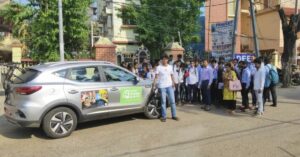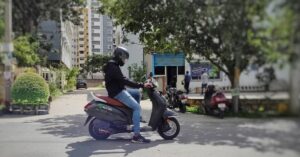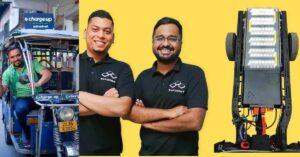This Startup is Making India Self-Reliant in Li-Ion Batteries for Electric Vehicles
Hyderabad-based Allox, co-founded by Mourya and Rajiv Reddy in 2016, claims to be India’s leading producer of carbon-coated lithium iron phosphate (LiFePO4), which is used as a cathode material in lithium-ion batteries.
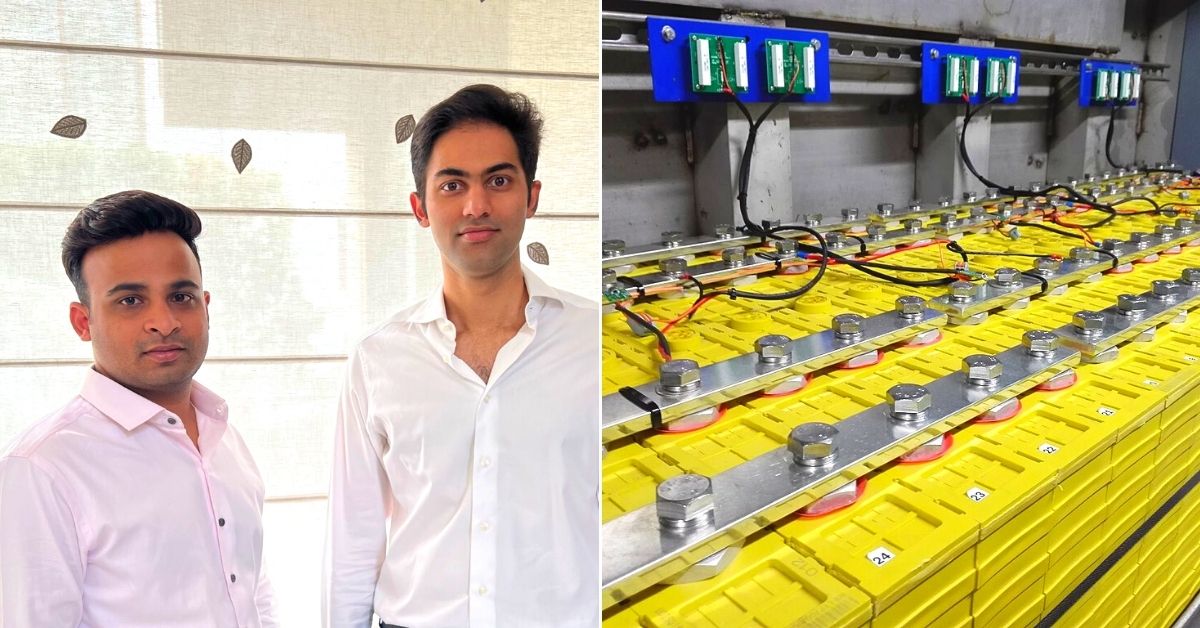
One of the biggest stumbling blocks in the Indian electric mobility sector is the inability to domestically manufacture lithium-ion cells, a fundamental component of batteries needed to power your vehicles. As per this 21 December 2021 article in the Times of India, “India’s entire feed of lithium-ion cells is imported from China and Taiwan and assembled into batteries locally.” (Images above of Allox co-founders Sri Mourya, Rajiv Reddy (Left) and a representational image of multiple lithium iron phosphate modules courtesy Wikimedia Commons (Right))
Lithium-ion batteries account for 40-50% of the cost of an electric vehicle (EV). In India, unfortunately, EV battery manufacturing is more about assembling batteries than designing, developing and producing them from scratch locally.
To make lithium-ion batteries for EVs, you need cells. These cells require anode materials, cathode materials, separators, binders, etc. While binders, electrolytes are made by certain big companies in India, anode materials are abundantly available in the country like natural or synthetic graphite, and you have major ventures engaged in manufacturing it.
“India does not have a cathode manufacturer because you need lithium. Given the scarcity of the raw material and the lack of technical expertise to manufacture cathodes in India, nobody got into the market of making battery cells. Since we are heavily dependent on China, you import low-quality materials (battery cells) from the comfort of your home. Once people got into their comfort zone, not many were encouraged to set up these battery cell manufacturing industries. Since there are no cell manufacturing industries, there are no cathode manufacturing industries,” says Anjani Sri Mourya Sunkavalli, co-founder of Allox, a Hyderabad-based natural resource company looking to change this reality, speaking to The Better India.
Mourya also claims that Allox is India’s leading producer of carbon-coated lithium iron phosphate (LiFePO4) or commonly known as LFP, which is used as a cathode material in lithium-ion batteries. These LFP batteries are one of the most widely used compositions, used in a variety of ways from electric vehicles to residential batteries to grid-scale applications.
It’s imperative to note that lithium is found in the form of either brine (salt flats) or hard rock that needs to be processed into lithium carbonate and lithium hydroxide at the mine. The strength of lithium carbonate comes from its high-energy storage, insulating and heat resistant capabilities.
Allox imports good quality and battery-grade lithium carbonate from their partner mines across South America. Once they bring it to India, they enhance it into LFP through a patented process, for which indigenously-developed technology was acquired from the International Advanced Research Centre for Powder Metallurgy and New Materials (ARCI) in August 2021. The ARCI is an autonomous research and development centre of the Department of Science and Technology (DST), Government of India.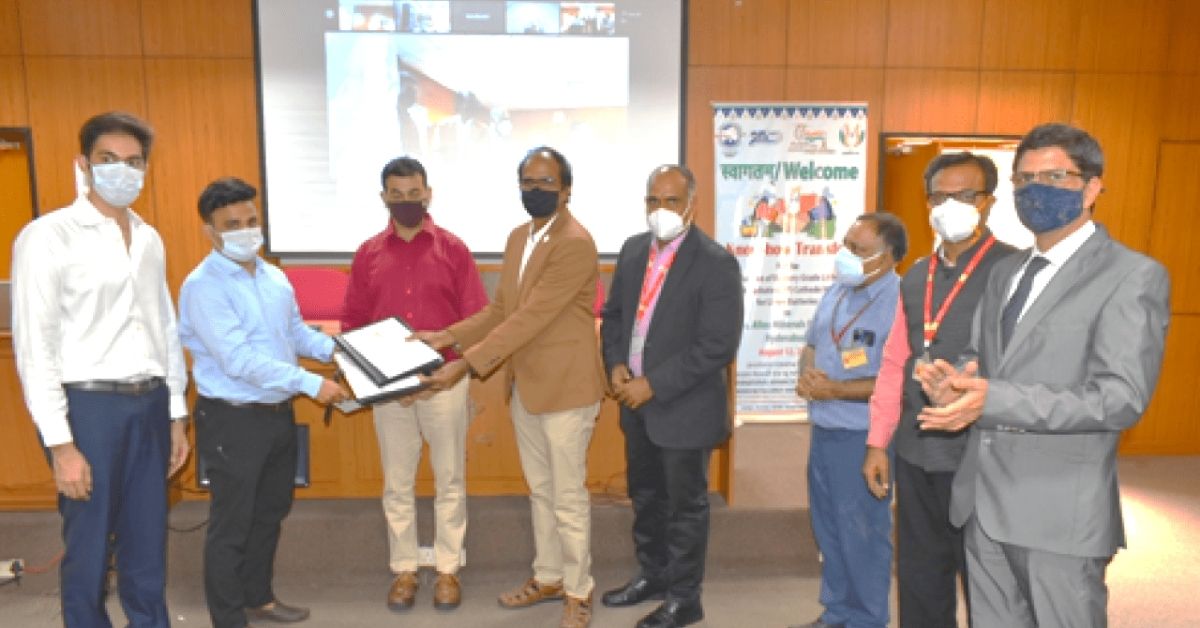
“LFP is the most suitable cell chemistry for Indian conditions. However, India is behind on cathode material production because until recently people were focused on NMC (Lithium Nickel Manganese Cobalt Oxide), which many considered the best material for being used as cathode material for batteries The NMC chemistry, however, doesn’t have thermal stability in tropical conditions, which is a major liability. Without the required thermal stability, your battery may malfunction like in some well-reported cases. Eventually, Indian OEMs figured out that the LFP battery chemistry is most suitable for a country with multiple weather conditions like India given its greater thermal stability,” explains Mourya.
But when the focus was on NMCs, Indians weren’t too keen on manufacturing them because rare earth minerals like nickel and cobalt are scarce.
“With LFP, it’s only the lithium we are importing. The rest is domestically sourced like iron oxide, phosphate and graphite. E-Mobility companies like Tesla and Arrival UK are also moving towards LFP. Besides C-LFP (carbon-coated LFP), ARCI has developed the technology for making LTO, an anode material called lithium titanate. Experiments are happening around the world, including India, to combine LFP as a cathode and LTO as an anode. LTO helps the battery charge fast, and LFP retains that charge and possesses greater energy holding capacity,” he adds.
If and when the chemistry works out, it’s a massive advantage for Indian EV OEMs because it offers thermal stability and fast charging. Having said that, the lithium-ion battery industry is not just about electric mobility, which comprises just a fraction of its usability. These batteries are more prominently used in stationary applications, energy storage, telephone towers, etc.
“Our indigenous technology developed by ARCI has proven to manufacture better quality C-LFPs than the ones found in battery cells imported from China. We are the first company in India to produce it in India and will go into commercial production by the end of 2023. Currently, we are at a manufacturing capacity of 50 kg of C-LFP per day, but our engineers and technology partners are working to increase that to 10-15 tonnes per day. Besides mass-producing C-LFP, we are working alongside the Telangana government to ensure uninterrupted supply of lithium carbonate from various parts of the world to reduce dependence on China,” he says.
In fact, according to this 25 August 2021 report in PV [Photovoltaic Markets and Technology] Magazine, “The company, through a joint venture led by a corporation of the government of Telangana, is acquiring mining rights of lithium in Bolivia and Brazil, alongside [the] mining of key battery-related minerals in India to ensure an uninterrupted supply chain to the existing and upcoming industries. It has already tied up with two companies in Bolivia and Brazil.”
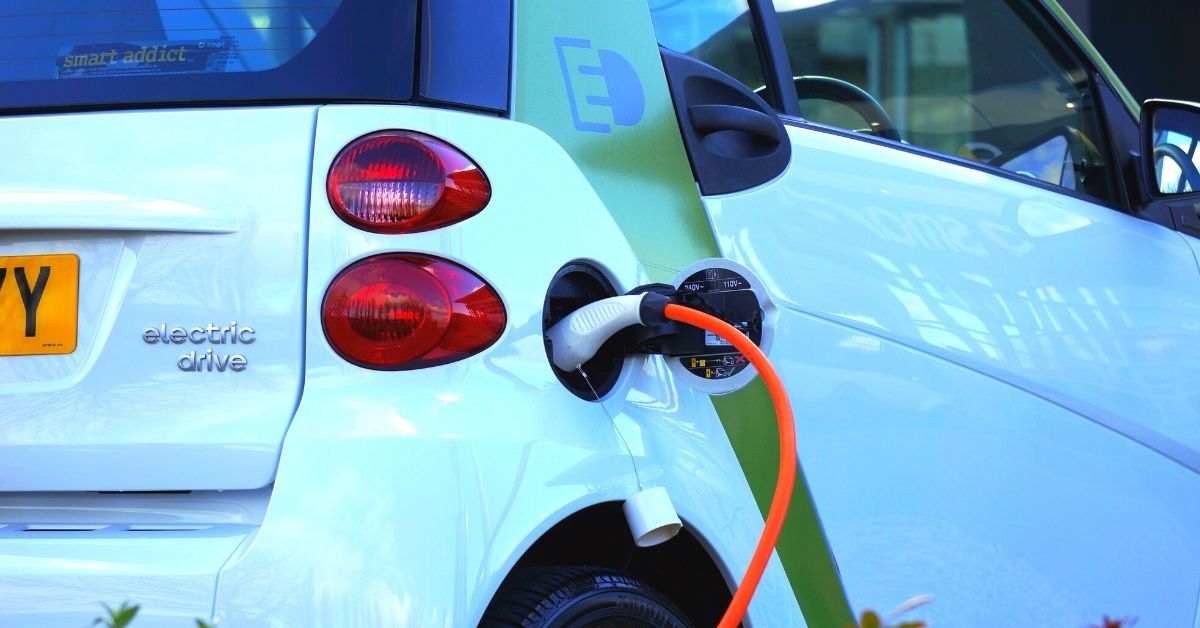
For the Future
Allox was co-founded by Mourya and Rajiv Reddy, an industrial engineer, in 2016 as a mining company, and wanted to discover scarcely found minerals and source them back to India by acquiring mining rights internationally. Currently bootstrapped, they zeroed down on lithium and are focussed on selling C-LFPs to companies setting up shop to manufacture battery cells.
Moreover, to encourage Indian corporations to develop this industry, the Government of India in May 2021 announced a Rs 18,100 crore production-linked incentive (PLI) scheme for the manufacturing of Advanced Chemistry Cells (ACC).
As per this Times of India report, “ACCs are the new generation of advanced storage technologies that can store electric energy either as an electrochemical or as chemical energy and convert it back to electric energy as and when required. As all demand for ACCs in India is currently being met through imports, the scheme looks at reducing import dependence by setting up a cumulative 50 GWh of ACC manufacturing facilities.”
However, as per a report in Mercom India on 17 January 2022, “the Ministry of Heavy Industries tender to develop 50 GWh of advanced-chemistry battery cell manufacturing units in India under its production-linked incentive (PLI) scheme has secured bids for 130 GWh of capacity”.
“Few players who have applied for the PLI scheme have been in touch with us while we further enhance and explore the technology. By 2023, the demand for C-LFP in India will be 100,000-150,000 tonnes per year,” says Mourya to The Better India.
However, even if Allox decides to sell C-LFPs tomorrow, no one will buy them because these companies are still in the process of setting the battery cell manufacturing industry up.
“Many of them will only be running at 25% capacity by the start of 2024. But we expect to set up a facility to get into the construction of C-LFPs by Q4 of FY 2022/23. We are finalizing the designs, vendors and everything else, while the supply chain is taken care of. By the end of 2023, we’ll be up and running with production even though we’ll have to initially export most of our products till the time Indian corporations are ready,” he explains.
Elaborating further on Allox’s market, he says, “Our prospective customers are all the major names who are getting into the PLI scheme, particularly large Indian corporations. Some of them are in talks with us since they all require this material. In terms of electric vehicle ventures, our job is done once we supply C-LFP to battery cell manufacturers. It’s these manufacturers who will go on to supply battery packs to OEMs in the electric mobility segment.”
(Edited by Yoshita Rao)
Like this story? Or have something to share? Write to us: [email protected], or connect with us on Facebook and Twitter.
This story made me
- 97
- 121
- 89
- 167
Tell Us More
We bring stories straight from the heart of India, to inspire millions and create a wave of impact. Our positive movement is growing bigger everyday, and we would love for you to join it.
Please contribute whatever you can, every little penny helps our team in bringing you more stories that support dreams and spread hope.






